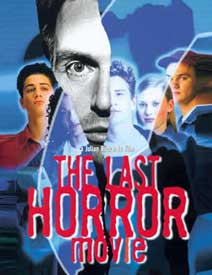 If the usual cheesy slasher were the measuring rod, then The Last Horror Movie (2003) is a better film than most of those. If the usual cheesy slasher were the measuring rod, then The Last Horror Movie (2003) is a better film than most of those.
But compared to the artfully disturbing films within the genre, such as this failure tries to imitate (Henry Portrait of a Serial Killer, American Psycho), then this one just doesn't cut the cake.
As essentially a one-man show with minor support cast, Kevin Howarth had to carry The Last Horror Film alone. He rather seems to be pretty smart as an actor, & could've pulled it off if he'd had a less awkwardly pompous script to work with, or a more skillful director.
But having an awfully thin story embodied by a mediocre script wasn't something an actor can easily repair as he goes along.
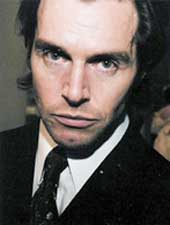 The script incites groans, much as do bad puns, at points the scriptwriter probably thought were the wittiest or cleverest or most darkly funny observations of life & art & killing. The script incites groans, much as do bad puns, at points the scriptwriter probably thought were the wittiest or cleverest or most darkly funny observations of life & art & killing.
It had its effective moments of comedy as our wedding videographer by vocation, serial killer by avocation, attempts to make a video documentary about his own life, hiring a doomed assistant along the way. It hits a few high strides as black comedy.
But the ending which attempts to blur the distinction between filmic reality & the viewer's life, in which the psycho tediously threatens to come & get the viewer next, was so stupid it expunged any moments of adequacy leading up to that conclusion.
This threat to the audience failed as jest, & it certainly never had a chance of making anyone believe, "Oh no, what if this isn't just a movie & he really is on the way over here to kill me." It was merely eye-rolling.
The best scene was with Grandma (Rita Davis), & that was unfortunately in the "deleted scenes" feature.
Leslie (Nathan Baesel) is a psycho killer in training. As Behind the Mask: The Rise & Fall of Leslie Vernon (2006) begins, he hasn't yet killed anyone, but there's no mistaking him. He's the real deal. His heros are Freddy Kruger, Michael Meyers & Jason Vorhees.
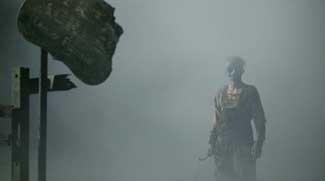 He has invited a documentarian, Taylor (Angela Goethals), to record his adventures & his first psycho killings. He has invited a documentarian, Taylor (Angela Goethals), to record his adventures & his first psycho killings.
Leslie's quite a nice, funny guy with a well developed understanding of how the whole "business" of stalking, obsession, & terror functions. He explains it blow for blow well in advance of doing it. He wants the documentary to be a relevant social document.
In the film's worldview, the Freddies & the Jasons seen in other films are real people. There's a well-networked community & culture of psycho killers who appreciate one another, have one another's families over for dinner, with the older established psychos willing to mentor a young up & comer like Leslie. Thereby Leslie is able to take the documentarian to meet with a retired psycho killer.
A witty script & decent acting make this film a gem of the genre. The idea that evil killers are at their core jolly & fun-loving with a sense of community no less than herpetologists or science fiction fans, well, it's presented as credibly as it is funny.
Worked into the tale is a great explanation of why hiding in the closet often works. It's all part of the psycho killer code of respect for sacred space. Other cliche elements of psycho killer movies are given cultural context & meaning within the killer community itself.
The librarian is played by a great character actress from horror films of the past, none other than Zelda Rubinstein.
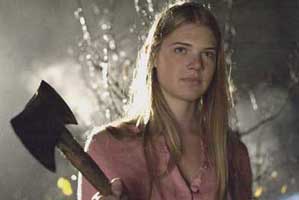 She does a fantastic job of relating to the local legend upon which Leslie has "planted" & upon which he is basing his soon-to-erupt persona as a supernatural avenging psychotic. She does a fantastic job of relating to the local legend upon which Leslie has "planted" & upon which he is basing his soon-to-erupt persona as a supernatural avenging psychotic.
Another legend of horror cinema, Robert England of Freddy Kruger fame, shows up unexpectedly as Doc Halloran, tracker of supernatural evils.
In the psycho community the Doc Hollaran character is a type known as "the Ahab." Every great psycho killer needs one. A seriously demented believer who seeks to stop true evil helps to justify the existence of the psycho. Without an Ahab, the psycho can never attain the arch & ultimate level of his art.
Documentarian Taylor is as devoted to her art as Leslie is to his, so they have much apparently in common. However, when the night comes for it all to unfold in the ultimate act, Leslie renegs on her non-interference agreement & decides to stop the murders & sets out to warn the teenagers gathered to party in an isolated farmhouse.
Even this, as it turns out, has been part of Leslie's bizarre plan to contextualize & mythologize his actions. And when Taylor realizes that the traditional virgin Kelly (Kate Lang Johnson) is not after all a virgin, that means Taylor, who actually is a virgin, has to be mythic heroine capable of defeating the slayer.
The ending turns into a pretty standard stalker slasher, so that arrival is not as imaginative as the journey. Behind the Mask is even so, beginning to end, a top-grade self-reflective example of its genre.
copyright © by Paghat the Ratgirl
|
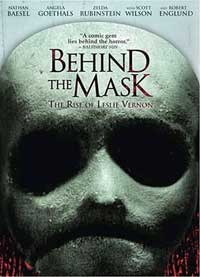

 The script incites groans, much as do bad puns, at points the scriptwriter probably thought were the wittiest or cleverest or most darkly funny observations of life & art & killing.
The script incites groans, much as do bad puns, at points the scriptwriter probably thought were the wittiest or cleverest or most darkly funny observations of life & art & killing. He has invited a documentarian, Taylor (Angela Goethals), to record his adventures & his first psycho killings.
He has invited a documentarian, Taylor (Angela Goethals), to record his adventures & his first psycho killings. She does a fantastic job of relating to the local legend upon which Leslie has "planted" & upon which he is basing his soon-to-erupt persona as a supernatural avenging psychotic.
She does a fantastic job of relating to the local legend upon which Leslie has "planted" & upon which he is basing his soon-to-erupt persona as a supernatural avenging psychotic.